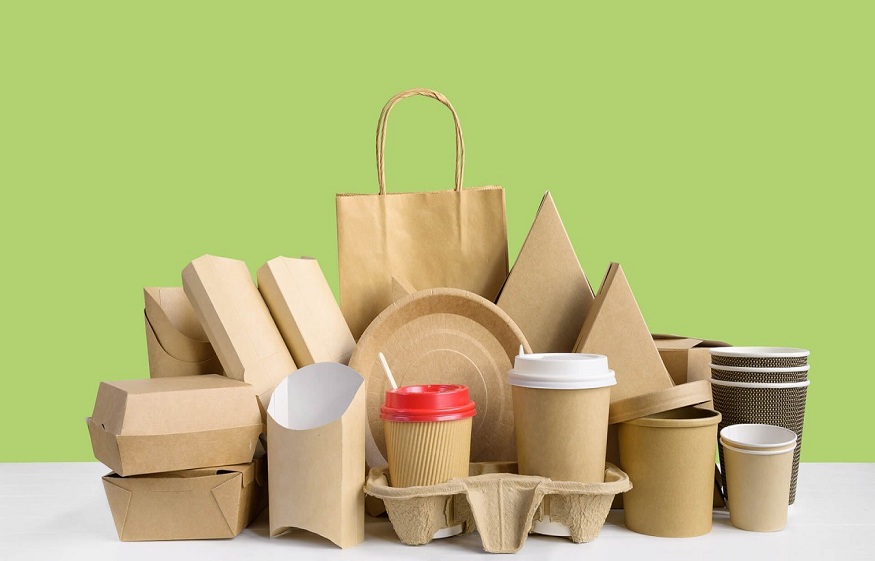The Benefits of Biodegradable Packaging Materials for Food
5 min read
Introduction
In recent years, a heightened consciousness of the detrimental environmental effects caused by conventional packaging materials in the food industry has spurred a significant transformation. A notable shift is occurring towards embracing sustainable and eco-friendly alternatives, particularly in the realm of biodegradable packaging materials for food.
This progressive movement not only addresses the urgent need to reduce plastic waste but also fosters a greener approach to food packaging that aligns with the principles of environmental responsibility. As consumers and industries alike join forces in this endeavour, the future looks promising for a more sustainable and nature-friendly packaging landscape.
In this article, we will explore the various benefits of using biodegradable packaging materials for food and how they contribute to a more sustainable future.
1. Environmental Advantages
Biodegradable packaging materials for food are made from natural sources such as plant-based materials and renewable resources. Unlike conventional packaging materials like plastic and Styrofoam, which can take centuries to decompose, biodegradable materials break down much faster, minimizing their impact on the environment. By using biodegradable packaging, we reduce the burden on landfills and decrease the amount of plastic pollution in oceans and waterways, making it a crucial step towards a cleaner planet.
2. Reduced Carbon Footprint
As opposed to manufacturing traditional materials, producing biodegradable packaging materials often uses less energy. For example, the creation of plastic packaging necessitates the extraction of petroleum and energy-intensive procedures, which increases greenhouse gas emissions. Contrarily, the carbon footprint connected with the manufacture of biodegradable materials is generally lower since they frequently derive from renewable resources. We can help a more sustainable food sector and stop climate change by making biodegradable choices.
3. Support for Sustainable Practices
We should buy eco friendly packaging materials for food not only benefits the environment but also catalyzes driving sustainable practices throughout the food industry. The rising consumer preference for environmentally conscious options exerts significant pressure on businesses to reevaluate their operations and incorporate more eco-friendly solutions. As customers actively opt for biodegradable packaging, they effectively communicate their commitment to sustainable living and encourage the food industry to follow suit. This consumer-driven demand sets in motion a virtuous cycle, inspiring businesses to adopt responsible sourcing practices and innovative packaging solutions, ultimately contributing to a greener and more planet-friendly future.
4. Preservation of Food Quality
In addition to being environmentally friendly, biodegradable packaging materials are essential for maintaining the quality and freshness of the food they contain. Biodegradable materials are normally free of poisonous compounds, as opposed to certain traditional materials that may leak dangerous chemicals into the food, guaranteeing that the food stays uncontaminated and safe for ingestion. Furthermore, certain biodegradable substances, such as compostable films, act as a barrier against oxygen and moisture, increasing the shelf life of perishable goods.
5. Versatility and Customizability
The availability of a diverse array of biodegradable packaging materials for food offers unparalleled versatility and adaptability, catering to the unique demands of various food products. With options ranging from biodegradable wraps and containers to bags and cups, businesses can seamlessly integrate these eco-friendly alternatives into their packaging strategies. Notably, these materials present an opportunity to align sustainability goals with functional and aesthetic requirements, ensuring that the packaging remains both efficient and visually appealing. Whether it’s for perishable goods, hot beverages, or cold treats, the wide selection of biodegradable options empowers businesses to make environmentally responsible choices without compromising on quality or presentation. This fosters a positive shift towards greener practices within the food industry, contributing to a more sustainable future.
6. Positive Impact on Brand Image
In the current socially conscious marketplace, consumers place immense value on businesses that actively embrace sustainable practices. Opting for biodegradable packaging materials is a powerful way for companies to showcase their dedication to environmental responsibility, resonating with eco-conscious customers. By making this conscious choice, businesses can enhance their brand image, positioning themselves as environmentally responsible and forward-thinking entities. As leaders in their respective industries, these companies set a commendable example, inspiring others to follow suit and adopt eco-friendly packaging solutions. This ripple effect amplifies the positive impact, encouraging a collective commitment to sustainability and fostering a greener and more environmentally aware business landscape.
7. Compliance with Regulations
With the escalating global focus on environmental issues, governments are taking significant steps to curb packaging waste and pollution through stricter regulations. By adopting biodegradable packaging materials, businesses can take a proactive approach to comply with these evolving laws, mitigating the risk of potential penalties and legal repercussions. Embracing eco-friendly packaging demonstrates a commitment to aligning with environmentally responsible practices and showcases a company’s dedication to being a conscientious corporate citizen. This responsible behavior not only safeguards the environment but also enhances a brand’s reputation, establishing it as a socially responsible and forward-thinking entity. By staying ahead of regulatory demands and prioritizing sustainability, businesses can contribute to a more environmentally conscious future while safeguarding their long-term success.
8. Consumer Education and Awareness
Using biodegradable packaging for food gives businesses a special opportunity to inform customers about the value of sustainable choices. Businesses may successfully explain to their clients the many advantages and significance of environmentally friendly materials by actively adopting environmentally friendly packaging. As customers become more aware of their purchasing habits and broaden their support of environmentally friendly items beyond food packaging, this increased knowledge may have a domino effect. More people making educated decisions about how they live their lives and how they affect the environment as a result of this cascade effect contributes to sustainability. The cumulative effect of these thoughtful choices encourages a wider shift towards a greener and more sustainable future for both companies and consumers.
Conclusion
In conclusion, the use of biodegradable packaging materials for food brings numerous benefits, transcending environmental preservation. From reducing carbon footprints and supporting sustainability to preserving food quality and enhancing brand image, these eco-friendly alternatives are pivotal in creating a greener and more responsible future.
For those seeking to buy eco-friendly packaging materials for food or order online disposable cup in dubai, accessible options are now readily available. Embracing these sustainable choices not only combats plastic waste and climate change but also empowers consumers to make a positive impact through everyday decisions.
With environmental consciousness on the rise, choosing biodegradable materials demonstrates a commitment to a healthier planet and fosters a legacy of responsible stewardship for generations to come.






